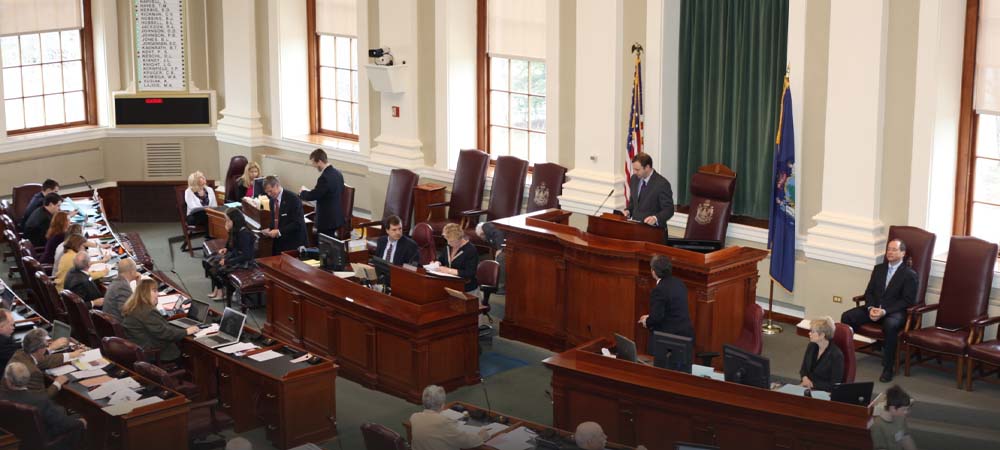- The original version of LD 585, a tribal sovereignty bill in Maine, would grant Maine’s tribes exclusivity over online sportsbooks in Maine.
- Two competing proposals – LD 1352 and an amendment to LD 585 that has yet to be formally proposed – would open the market to commercial operators as well as tribal entities.
AUGUSTA, Maine – Maine is currently considering two potential avenues toward the legalization and regulation of sports betting.
There is one that would grant Maine’s native tribes exclusivity over online sports betting and one that would create a more open sports betting market, granting Maine’s tribes a percentage of revenue derived from online sports betting.
Governor’s Bill Grants Tribes Online Exclusivity
LD 585 – amended by Governor Janet Mills – began as a bill to improve Maine’s tribal relationships.
Under its current version, the bill would grant Maine’s Wabanaki tribal entities the exclusive right to offer online sportsbooks in Maine.
Commercial casinos and racetracks would be permitted to operate land-based sportsbooks, but not online sportsbooks.
However, not everyone in Maine is satisfied with this prospective arrangement. Some lawmakers say that Gov. Mills’ bill would create unnecessary division by not allowing commercial operators to host online sportsbooks.
Other Proposals Open Market To Commercial Operators
A different bill, LD 1352, would allow commercial casinos and racetracks – as well as tribal operators – to offer online sportsbooks.
LD 1352 has already been approved by Maine’s House of Representatives and Senate, and currently awaits financial directives from the Appropriations Committee.
It is considered to be at a high risk of veto by Gov. Mills considering its status as a competitor to her bill.
According to Sen. Joe Baldacci, the latter bill would create a better sports betting environment for both operators and sports bettors.
Last week at a press conference, he introduced an amendment to LD 585 that would similarly legalize sports betting and allow commercial operators access to the market.
“One of the first things I want to express is that we want to have this a win-win,” said Baldacci. “We’re not looking to create divisions. I think the governor’s bill, unfortunately, creates divisions.”
Baldacci is not alone in his belief that allowing both commercial and tribal operators would be the ideal outcome for Maine.
At the aforementioned press conference, a coalition of lawmakers and advocates – including Sen. Brad Farrin, and Jim Day, among others – supported Baldacci’s proposed amendment, making the case that both commercial and tribal operators should be granted online sportsbook licenses.
According to these lawmakers, Maine’s tribes are limiting their potential profit by leaving commercial operators out of the fold.
“I think it will generate more revenue for the state of Maine, which in turn will benefit the tribes even greater,” said Farrin.
According to the group, Mills’ bill would not only limit tribes’ potential profit – it would also lead to an inferior product for consumers.
“Giving exclusivity of all the online wagering to one entity isn’t good for the consumers in the state of Maine… It doesn’t mature the market to where it would maximize income to the state and all the participants,” said Jim Day, President of Winners Circle OTB, an off-track betting establishment that could be in line to receive an online sportsbook license under LD 1352 as well as Baldacci’s amendment.
To Tribes, LD 585 Represents A Step Towards Fair Treatment
For Maine’s tribes, Mills’ bill represents an effort from the Governor’s office to improve Maine’s relationship with the Wabanaki Tribe, which was not given the same protections and rights as other federally-recognized tribes elsewhere in the United States as a result of the federal government’s 1980 Maine Indian Claims Settlement Act.
“This tribal bill is about trying to overcome decades of issues around access to gaming by tribes… This was a negotiated bill with the Governor’s office, and we tried to be as inclusive as possible,” said Kirk Francis, Chief of Penobscot Nation, which is a part of the Wabanaki Confederacy. “This amendment will basically render the bill meaningless for the tribes. This is a tribal bill that is attempted to be hijacked by the casinos.”
Sports Bettors Of Maine See A Win-Win Situation
While it remains to be seen which of the competing sports betting proposals will be enacted, each would allow for legal sports betting as well as online sportsbooks, accessible throughout Maine – the major difference is who would operate them.
While sports bettors would likely prefer to see more open sports betting market than the one originally proposed in Mills’ bill to breed more competition among sportsbooks, they will likely be satisfied with any proposal – provided it allows them to legally bet on sports online.
Advertising Disclosure
In order to provide you with the best independent sports betting news and content LegalSportsBetting.com may receive a commission from partners when you make a purchase through a link on our site.
News tags: Appropriations Committee | Brad Farrin | Janet Mills | Jim Day | Joe Baldacci | Kirk Francis | LD 1352 | LD 585 | Maine | Maine House Of Representatives | Maine Indian Claims Settlement Act Of 1980 | Maine Senate | Penobscot Nation | Wabanaki Confederation | Winners Circle OTB

Jerad has been a welcomed addition to the LegalSportsBetting.com writing team. Covering topics regarding the expansion of sports betting in the US, Jerad focuses on legislative efforts, bill signings and other methods for sports betting legalization. Finishing his education as a college baseball player, Jerad has first-hand knowledge of competitive sports, paired with years of personal sports betting as well. As a political science major at the University of Central Florida, Jerad covers the political, legal, and legislative aspects of sports gambling without any issues.


 Bitcoin Sports Betting Sites
Bitcoin Sports Betting Sites Best Online Sports Betting
Best Online Sports Betting Famous Sports Bettors
Famous Sports Bettors States With Legal Sports Betting
States With Legal Sports Betting Sports Betting Events
Sports Betting Events




